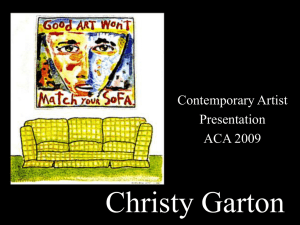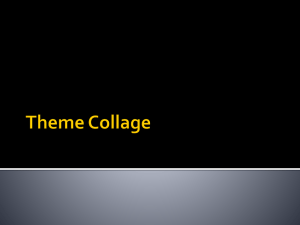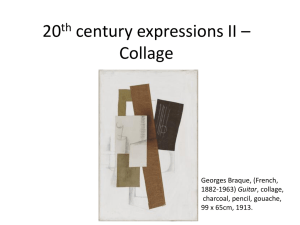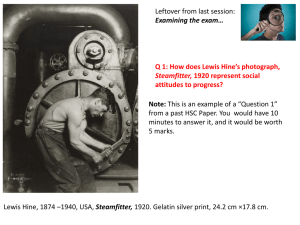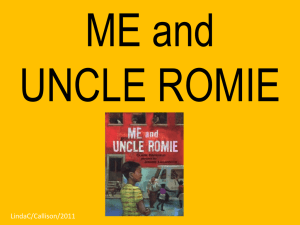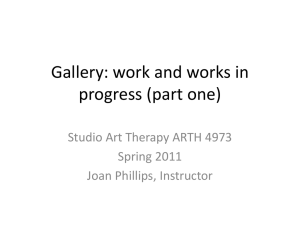Photo Chop! Pre-visit lesson 1
advertisement
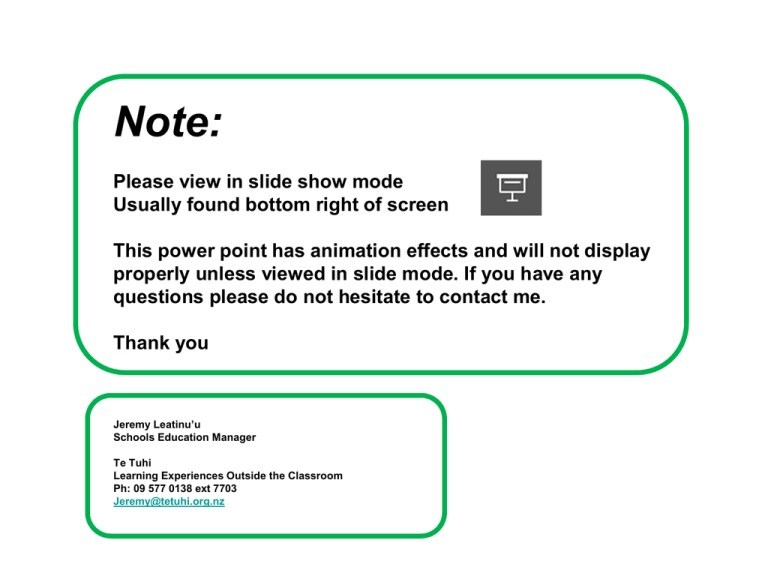
Note: Please view in slide show mode Usually found bottom right of screen This power point has animation effects and will not display properly unless viewed in slide mode. If you have any questions please do not hesitate to contact me. Thank you Jeremy Leatinu’u Schools Education Manager Te Tuhi Learning Experiences Outside the Classroom Ph: 09 577 0138 ext 7703 Jeremy@tetuhi.org.nz Welcome Thank you for using this pre-visit resource. We believe this will help strengthen student learning leading up to and during your gallery visit. Photo Chop! Te Tuhi Pre visit lesson 1 Welcome to Photo Chop! During the next few lessons we will be exploring… • The Art of Collage • 3D Collage • Digital Collage Image: http://ubuntudigest.blogspot.co.nz/2010/05/polaroid-frame-effect-using-gimp.html http://knightranger.deviantart.com/art/Polaroid-Frame-105135700 http://pixdaus.com Let’s start this lesson by exploring “The art of collage”. Image: http://www.patrickbremer.co.uk/#/?page=738&index=2 What is collage and where did it start? Collage and its origins th century From the 13ththe Century collage started to appear in Europe It was Since used Collage then more is widely believed technique inonwards Japan to of have collage during started the has at 10 been the time used ofall by the around calligraphers the with the technique being used and applied to different materials invention who copied of world paper poems particularly in China onto collaged around by artists. 200BC. papers. and spaces. A “collage” become a popular way make to create What is ahas Collage? And how do you one?art. Making a collage Artists would assemble and glue different materials to a piece of paper or canvas. These include: Makingmaterials a collagemay means you can combine and recycle different • coloured materials and paper make them part of a new story or message. • newspaper clippings • ribbons • photographs • bits of artwork or text • and other interesting objects Image: http://www.rgbstock.com/photo/n3cU7wY/Crumpled+Coloured+Paper+Blue http://designerwallcoverings.com/WallpaperStore/natural-textiles-and-ecotextures-rice-papers-c1604_67_72/romano-rice-paper-03-ocre-p-1169 http://ramonabarsalona.blogspot.co.nz/2011/05/newspaper-clippings-to-be-edited_10.html http://depositphotos.com/1223562/stock-illustration-Gold-medal-with-yellow-ribbon.html http://www.clker.com/clipart-26981.html http://www.royalhigh.edin.sch.uk/departments/departments/CDT/ahgc_0708_blender_vegetation.html http://www.anderes-spielen.de/epages/61855634.sf/en_GB/?ViewObjectID=30654906 Over the years artists have used the collage technique in different ways and in different forms. Lets take a look at 4 artists who explore collage in different ways. Collage and painting Glass and bottle of Suze 1912 Violin 1912 -13 Guitar 1913 Artist Pablo Picasso was one of the first to mix collage with his paintings and drawings. He would cut printed text or pictures into shapes and puzzle them in with his drawing or painting. Image: http://www.moma.org/collection/browse_results.php?object_id=38359 http://digiart2011.blogspot.co.nz/2011/03/collage-through-times.html http://pomo.cca.edu/~cjohnson/project4collpicass4.html Collage and painting Double River 2010 Farm 2006 Double Range 2010 Sanski 2011 Knin 2011 NZ artist Kate Woods combines painting with photography in her collage art works. She often uses photographs of New Zealand landscapes and changes their appearance by painting geometric sculptures. They almost appear as time portals to other worlds. Image: http://www.katejwoods.co.nz/ Collage as cut outs The Sorrows of the King 1952 The Horse, the Rider and the Clown 1947 The Parekeet and the Mermaid 1952 Polynesia, The Sea 1946 Large Composition with Masks 1953 After painting for many years Artist Henri Matisse stopped and started making paper collages. He began painting large pieces of paper in bold colours, then cutting out shapes, figures and objects and arranging them in interesting ways. Some collages would be so big they could easily fill an entire gallery wall. Image: http://theredlist.com/wiki-2-351-861-414-1293-401-406-view-fauvism-profile-matisse.html http://en.wikipedia.org/wiki/The_Sorrows_of_the_King https://www.pinterest.com/pin/279926933063401511/ http://magellanstraits.com/2014/04/16/matisse-cut-outs-a-dont-miss-exhibition/ http://www.waldemar.tv/2014/04/henri-matisse-the-final-cut/ Collage as portraits Outward 2012 Harry 2012 British artist Patrick Bremer shows us how you can create intricate and detailed collage portraits. Patrick combines craft paper, newspaper, magazine pages and carefully cuts out, arranges and pastes his shapes into place to capture the unique features of his subjects. Image: http://www.patrickbremer.co.uk/ As we have seen, Collage has a rich history and Let’s recap on what we have learnt so far… has been used by artists in different ways. What have we learnt so far? Collage • originated in China, used more widely in Japan and eventually being used by people all around the world. • is an artwork made by combining a range of materials using glue, layering and arrangement. • is a technique used by artists in different ways to create art. In the next lesson we will explore 3D Collage End of lesson

